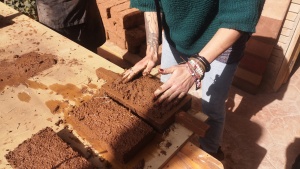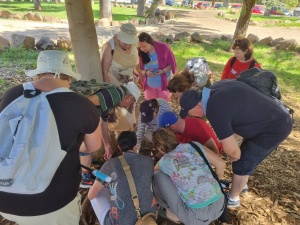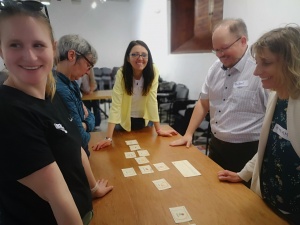Early School Leaving (ESL) is a pressing concern in all EU countries because it is directly related to unemployment, social exclusion and poverty, especially. The Europe 2020 strategy has set the goal of reducing the proportion of school leavers to below 10%. This training course will focus on preventing ESL.
In this course, teachers and trainers will understand the experiential learning methodology and learn how to create a stimulating and engaging learning climate. By adopting an inclusive learner-centred vision of education, teachers can increase motivation and sense of belonging among students, irrespective of individual and family-related factors, socio-economic status or life experiences. With this form of active learning, all learners and their diverse needs are at the centre of education. They are the actors of their own learning.
The course doesn’t offer quick solutions. Instead, it shows how to achieve sustainable results in the long term with holistic, systemic approach.
The nature of this course is highly practical and hands on, so the participants will learn about Kolb‘s Experiential Learning Cycle (Experiencing, Reviewing, Concluding, Planning and Transfer of learning) through group dynamics, role plays and practical activities.

Objectives
- Get insights on the causes and effects of Early School Leaving at European level.
- Reflect on the role of the teacher in preventing ESL.
- Understand the experiential learning methodology and its benefits for preventing ESL.
- Learn to apply the experiential and active learning methods in everyday thinking.
- Exchange best practices on how to detect and handle the needs of learners with vulnerable backgrounds.
- Acquire experiential methodological tools that encourage participation, cooperation and motivation of students.
- Learn how to lead and deliver simple experiments, group dynamics and exercises with low cost.
- Get to know how to foster a stimulating and welcoming environment and encourage diversity and collective learning.
Target audience
- Teachers: pre-school, primary, secondary and vocational schools.
- Teacher trainers.
- School leaders and other school staff.
Any professional workers who would like to learn different methods and approaches for better understanding, motivating, working with learners from vulnerable backgrounds in order to prevent Early School Leaving.
It is also relevant for teachers and staff that work in adult education centers that teach early school leavers as well as other teachers interested in applying the experiential learning methodology in other fields.
For groups of 8 teachers or more, we adapt the course content and approach to the specific needs of your educational center and offer personalized funding assistance.

Training activities
Day 1 – Introduction to Early School Leaving
- Introduction and ice breaking: Getting to know each other.
- Video: Early School Leaving in Europe
- Preliminary questions Method: What is Early School Leaving and how to recognize it?
- Introduction to Early School Leaving and inclusion at European level – what has been done so far?
- Group dynamics: Generating collaborative attitude in the group and raising the energy level.
- Reverse brainstorming exercise: What are the causes and effects of Early School Leaving?
Day 2 – The role of the teacher in ESL prevention
- Group dynamics and wrap up exercises
- EU Strategies and Policies for ESL prevention
- Group work and reflection exercise: A whole school approach to tackling ESL by involving all stakeholders
- Case scenarios: The role of the teacher in ESL
- Sharing pedagogical approaches on ESL

Day 3 – Experiential learning methodology
- Team building exercise
- Think-Pair-Share exercise: What is experience?
- Concept mapping exercise on active learning methodologies (experiential learning, learning by doing, hands on approach etc.)
- Case study: Applying Kolb’s Experiential Learning Cycle
- Practical activity: Design of an experimental workshop removing a piece of the puzzle.
Day 4 – Experiential learning to prevent ESL
- Energizer and group building exercise
- Think-Pair-Share exercise: A learner-centered teaching approach to prevent ESL
- Group exercise: design an experiential methodological tool that encouraged participation increase motivation of students.
- Reflection: How can we connect curricula with real life and diversity in classroom to increase engagement?
- Exchanging good practices on how to detect and handle the needs of learners with vulnerable backgrounds.
- Practical work, case scenarios and group discussion
- Quick feedback session
Day 5 – Networking and closing
- Energizer and quiz
- Group dynamics: Networking skills
- Open discussion on possible future collaborations and planning follow up activities
- Summary of key learning points
- Final course evaluation and feedback
- Validation of learning outcomes and handling certificates
- Cultural activity or guided visit (optional)
Methodology
We tailor our working methods based upon the participants‘ needs and professional profiles in order to ensure easier adaptability and application of the tools to the real life.
Our standard methodology is based on active learning and it is highly participative and practical. We have a hands on approach that comprises group exercises, role plays, experiments, case studies and simulation exercises. We use collaborative learning techniques to foster the exchange of good practices and collective learning.
The pedagogical methods used in this training course are based on experiential learning and learning by doing. Our focus is on showing the participants how the learners’ motivation increases when they become the actors of their own learning because the teacher takes the role of facilitator or learning guide. Thus, the participants get the chance to experience on themselves the benefits of the experiential learning methodology at the same time as learning how to apply it in their classroom.
Energizers, games and group dynamics are foreseen daily in order to ensure a positive energy and a cooperative learning climate in the group.
Group reflections and daily brief feedback sessions are planned to help adapting the learning programme to the specific needs of the participants.
We organize optional social and cultural activities in order to give the participants the opportunity to get to know the Canarian and Spanish culture as well as to do some professional networking and exchange good practices.
Certification and validation of learning outcomes
- Certificates of attendance
- Support with the Europass mobility certificates
Upon request, we also provide educational centers with additional documents that are required to certify the presence to the course and the competences learned. .
As follow-up activities, we also create online group discussions so that the participants can share with their peers the results of the course and continue reflecting on how they can adapt the methodologies and tools learnt in their context.
Pre-register to our course!
Write us some details about your project idea. How many participants do you want to send? What are the profiles of the teachers/staff interested in the course?
